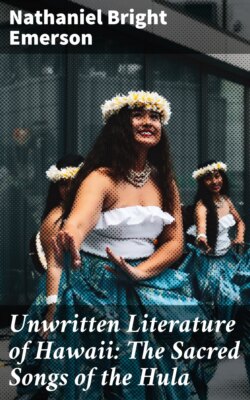Читать книгу Unwritten Literature of Hawaii: The Sacred Songs of the Hula - Nathaniel Bright Emerson - Страница 26
На сайте Литреса книга снята с продажи.
DÉBUT OF A HULA DANCER
ОглавлениеTable of Contents
The occasion is that of a lifetime; it is their uniki, their debut. The song chosen must rise to the dignity of the occasion. Let us listen to the song that enthralls the audience seated in the rushstrown lanai, that we may judge of its worthiness.
He Mele-Inoa (no Naihe) 38
Ka nalu nui, a ku ka nalu mai Kona,
Ka malo a ka mahiehie, 39
Ka onaulu-loa, 40 a lele ka'u malo.
O kakai 41 malo hoaka, 42
5
O ka malo kai, 43 malo o ke alii
E ku, e hume a paa i ka malo.
E ka'ika'i 44 ka la i ka papa o Halepó; 45
A pae o Halepó i ka nalu.
Ho-e'e i ka nalu mai Kahiki; 46
10
He nalu Wakea, 47 nalu ho'ohua. 48
Haki opu'u 49 ka nalu, haki kua-pa. 50
Ea mai ka makakai 51 he'e-nalu,
Kai he'e kakala 52 o ka moku,
Kai-ká o ka nalu nui,
15
Ka hu'a o ka nalu o Hiki-au. 53
Kai he'e-nalu i ke awakea.
Ku ka puna, ke ko'a i-nka.
Ka makahá o ka nalu o Kuhihewa. 54
Ua o ia, 55 nohá ka papa!
20
Noná Maui, nauweuwe,
Nauweuwe, nakelekele.
Nakele ka ili o ka i he'e-kai.
Lalilali ole ka ili o ke akamai;
Kahilihili ke kai a ka he'e-nalu.
25
Ike'a ka nalu nui o Puna, o Hilo.
Footnote 38:(return) Naihe. A man of strong character, but not a high chief. He was horn in Kona and resided at Napoopoo. His mother was Ululani, his father Keawe-a-heulu, who was a celebrated general and strategist under Kamehameha I.
Footnote 39:(return) Mahiehie. A term conferring dignity and distinction.
Footnote 40:(return) Onaulu-loa. A roller of great length and endurance, one that reaches the shore, in contrast to a Kalcala.
Footnote 41:(return) Kalai. An archaic word meaning forty.
Footnote 42:(return) Hooka. A crescent; the name of the second day of the month. The allusion is to the curve (downward) of a large number(kakai) of malo when hung on a line, the usual way of keeping such articles.
Footnote 43:(return) Malo kai. The ocean is sometimes poetically termed the malo or pa-á of the naked swimmer, or bather. It covers his nakedness.
Footnote 44:(return) Ka'ika'i. To lead or to carry; a tropical use of the word. The sun is described as leading the board.
Footnote 45:(return) Hale-pó. In the opinion of the author it is the name of the board. A skilled Hawaiian says it is the name given the surf of a place at Napoopoo, in Kona, Hawaii. The action is not located there, but in Puna, it seems to the author.
Footnote 46:(return) Kahiki. Tahiti, or any foreign country; a term of grandiloquence.
Footnote 47:(return) Wakea. A mythical name, coming early in Hawaiian genealogies; here used in exaggeration to show the age of the roller.
Footnote 48:(return) Ho'ohua. Applied to a roller, one that rolls on and swells higher.
Footnote 49:(return) Opu'u. Said of a roller that completes its run to shore.
Footnote 50:(return) Kua-pá. Said of a roller as above that dies at the shore.
Footnote 51:(return) Maka-kai. The springing-up of the surf after an interval of quiet.
Footnote 52:(return) Kakála. Rough, heaped up, one wave overriding another, a chop sea.
Footnote 53:(return) Hiki-au. Said to be the name of a temple.
Footnote 54:(return) Kuhihewa. Full name Ka-kuhi-hewa, a distinguished king of Oahu.
Footnote 55:(return) O iu. Meaning that the board dug its nose into the reef or sand.
